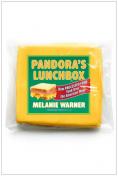BKMT READING GUIDES
Pandora's Lunchbox: How Processed Food Took Over the American Meal
by Melanie Warner
Hardcover : 288 pages
1 club reading this now
0 members have read this book
If a piece of individually wrapped cheese retains its shape, color, and texture for years, what does it say about the food we eat ...
Introduction
In the tradition of Fast Food Nation and The Omnivore’s Dilemma a fascinating and cutting-edge look at the scary truth about what really goes into our food.
If a piece of individually wrapped cheese retains its shape, color, and texture for years, what does it say about the food we eat and feed our children? Former New York Times business reporter and mother Melanie Warner decided to explore that question when she observed the phenomenon of the indestructible cheese. She began an investigative journey that takes her to research labs, food science departments, and factories around the country. What she discovered provides a rare, eye-opening—and sometimes disturbing—account of what we’re really eating. Warner looks at how decades of food science have resulted in the cheapest, most abundant, most addictive, and most nutritionally devastating food in the world, and she uncovers startling evidence about the profound health implications of the packaged and fast foods that we eat on a daily basis.
From breakfast cereal to chicken subs to nutrition bars, processed foods account for roughly 70 percent of our nation’s calories. Despite the growing presence of farmers’ markets and organic produce, strange food additives are nearly impossible to avoid. Combining meticulous research, vivid writing, and cultural analysis, Warner blows the lid off the largely undocumented—and lightly regulated—world of chemically treated and processed foods and lays bare the potential price we may pay for consuming even so-called “healthy” foods.
Editorial Review
Q&A with Melanie Warner

Q. What inspired you to want to explore the subject of processed foods?
A. The idea for a book crystallized for me not long after I began writing about the food and beverage industries in the mid-2000s. I went to a trade show called IFT (Institute of Food Technologists), one of the food industryâ??s largest gatherings. Inside a massive convention center, there were people selling things like micro-particulated whey protein, inner pea fiber and starches that had been modified to mimic fat or dietary fiber. Companies talked about food as an â??application,â?? as if it was a piece of software you put together. It seemed to me that our food had become vastly more technical and complicated than we realized, and we had little idea about what happens to it after it leaves the farm. This was the story I wanted to tell. Because in order to make good food choices, we first need to know what weâ??re eating.
Q. What should everyone know about processed foods?
A. Processed food represents an entirely new way of eating for us as human beings. Our diets have changed more in the last 100 years than they have in the last 10,000. So much of what we see in the middle aisles at grocery stores and on fast food menu boards simply didnâ??t exist a century ago.
This is a concern because, while the technology for processing food has advanced by leaps and bounds, our human biology hasnâ??t. The way our bodies handle food is stuck somewhere in the Stone Age, long before there was sugary boxed cereal, chicken nuggets and frozen dinners. Much of what we eat is now deeply out of synch with our biology.
Q. What surprised you the most in your research?
A. Where vitamins come from (many of them come from China and are derived from starting ingredients like sheep grease) and how prevalent soybean oil is in our diets (10% of total calories) and the health implications of that.
Q. How has your behavior changed since writing the book? Do you eat differently? Do you feed your children differently?
A. Although I generally follow my own advice â?? a diet with fresh, real foods at its foundation â?? I do eat processed foods, as do my kids. But the book has made me a little more careful of my choices. When you stare at ingredient lists long enough, the siren call of quick, convenient, indulgent food often goes on mute. I have to say that I am no longer tempted by donuts! I also stopped my occasional purchase of fast food French fries because of what I uncovered about the toxic compounds formed in heated frying oil. And I realized there we certain things I was buying prepackaged that could in fact be made relatively easily at home, like homemade mac and cheese for the kids, made with real cheese instead of the powdered stuff in the box.
Discussion Questions
No discussion questions at this time.Book Club Recommendations
Recommended to book clubs by 0 of 0 members.
Book Club HQ to over 90,000+ book clubs and ready to welcome yours.
Get free weekly updates on top club picks, book giveaways, author events and more








